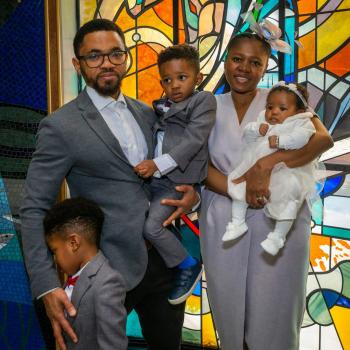Without meaning to, the Church often excludes intersex people. Here’s what one hurting commenter said the Church should do to include them.

Inclusion of LGBTQIA+ FOLKS
In my article, “How to Decide When Jesus’ Teachings are Silent,” I discussed how following the Holy Spirit’s still small voice can help Christians decide things that Jesus never explicitly mentioned. One paragraph in this article addresses marginalized communities that Jesus didn’t specifically affirm. I wrote:
Even red-letter Christians would like to think that Jesus answers all our questions—but the fact is, he doesn’t. It’s the Holy Spirit who will guide us when Jesus’ example is nonspecific. Like the inclusion of Gentiles, this is true for the inclusion of LGBTQIA+ folks, about whom Jesus took no moral position. I can just hear the Spirit now, saying, “What God has cleansed, you must not call unclean.” This same principle applies to others who are marginalized by Biblical law—like the physically challenged, people with diseases, those who suffer from mental illness, and left-handed people. When we understand that the Holy Spirit teaches us, even beyond the words of Moses, Jesus, and the apostles, then we are free to welcome all who are made in the image of God. I’m sure that as you continue to ponder this, you’ll find other examples.
The Pain of Exclusion
A reader I will call DJ, struggling with the pain of his own exclusion by the church, commented. With his permission, I’ve included it here.
So you claim to be about inclusion. And so you term-drop LGBTIAQ+ folks. Oh, do you really mean that? Okay. Let’s test that out.
I am intersex. An so far, seven decades on, I have yet to be “included” by Christians. It has never happened. So. Go ahead. Include me. What are you going to do for intersex people?
After some time for reflection, I responded:
Thank you for reading, and for your comments. I have a dear member of my family who is intersex. This is why it’s so important to me to use the term LGBTQIA+ instead of a shortened version. My family treasure does not attend church any longer, and they identify more with the Jewish faith. My heart breaks for you and my family member at the lack of feeling of inclusion in the church.
As you know, the Church has a history of promoting cisgender, heterosexual folks, to the exclusion of others. This may be due to the idea that we are to “go forth and multiply, fill the earth and subdue it.” Certainly, the Quiverfull movement has done a lot to promote this notion. Unfortunately, every time the Church promotes Cishet folks to the exclusion of others, it does damage to the entire body of Christ, as well as to those precious souls outside the Church.
What should the Church do for intersex people?
- We should repent of our historical Cishet fascination and embrace the diversity of gender identities and sexual orientations.
- We should educate the Church about intersex people. We focus so much on LGBTQ that we forget the IA+ folks. Many do not know that the Bible even mentions them specifically. (Click here to read my article where Jesus mentions transgender, intersex, and asexual folks.)
- The Church needs to sit down with, and listen to, the voices of intersex people. It needs to find out what’s important to them and see how the Church can address those needs.
- [As an afterthought, and not part of my original comment response, I will add] The Church needs to deemphasize its assumption that people will grow up, get married, and reproduce. This assumption stigmatizes all those who do not follow this pattern and makes it difficult for people to discuss their intersex conditions, making them even more invisible. (Not to mention that it also stigmatizes those who either can’t or choose not to get married and/or reproduce.)
- I’m sure you’ll notice that I’ve used “we” and “the Church” in the first…parts of this answer. Here, I’ll narrow it down and say, “I.” I will go ahead and write that article on church understanding and inclusion of intersex folks, that has been on the back burner of my ideas list for some time.
Thank you for your challenging comments. My heart breaks that you have felt on the outside of the Church for so long. I assure you that I do indeed care for intersex people and that it is part of my mission to make them feel included, welcomed, loved, and honored in the Church. It’s my goal to treat each one the same as I would treat my dear intersex family member.
DJ replied…
It was my hope as a young person that the over-all social justice endeavors of the mainline churches would extend in some partial way to me. I was an ordained ELCA pastor, social worker, public school teacher, etc. My early thought wasn’t that the Church would address me specifically, but would not exclude me if I should ever out myself. Generally, I placed more hope in the Church influencing the general culture toward greater humanity for all. This has failed. For intersex people, the experience of exclusion/oppression is universal. Even many LGBT groups want nothing to do with us.
The most crucial matter is what to do for intersex youth. If Trans youth are so on the ropes, the current politics will press intersex youth even more into the closet.
As a matter of public policy, I see two main issues that should always be dealt with by the Church or any entity that may come into contact with intersex youth/persons. 1) The Silence has to end. 2) The medicalization of intersex has to end. People should be allowed to be as they are…if they so choose. Forced surgery, chemical treatments, and psychological pressure to be binary has to end.
Who do we see about this?
As I’ve been outing myself more over the last couple of years….to utter silence in the vast majority of cases, I’ve become convinced that “I” ought to be highlighted above the LGBTQIA+ acronym. Many just don’t mean anything by putting the I in it…it gets lost. The word INTERSEX needs to get used on front burners. Society shouldn’t be allowed to just silence and run. And I don’t think this is the job of intersex people themselves. We didn’t set the system up. We shouldn’t be ones who risk alone in silence to take it down…only to be in the crosshairs of the local AR-15 maniac.
I converted to Judaism. One thing I’ve learned is that there are convergences in the phenomena of hatred against Jews and other groups…in terms of methodology. The canards employed against Jews and others are easily transferred to still other groups. Old hatreds are used as templates for new hatreds. The names just get changed.
In regard to the mainline churches, again…I see it first and foremost as an issue of overall policy. Church departments should take on the cause of intersex inclusion in a singular fashion…starting with the two main points I highlighted above. If the Church organization is going to remain silent…and insist on silence…then individual good-will efforts to personally include intersex remain at that level.
Again, thank you very much for your response.
DJ’s Two Main Issues
DJ said, “I see two main issues that should always be dealt with by the Church or any entity that may come into contact with intersex youth/persons.” I want to look at these a little deeper.
- “The silence has to end.” I hope that by sharing these comments outside of the comment box, I have done something to give voice to one hurting person. Beyond that, I hope that the larger Church will take notice. Regardless of what people think of new pronouns for transgender folks (you really should use whatever pronouns a person prefers—regardless of what category YOU want to put them into), the very existence of intersex people should convince us that we need nonbinary pronouns and nonbinary categories for people. Many intersex people simply cannot identify as “he/him” or as “she/her.” Again, not to diminish the special needs of trans folks, but this article focuses on intersex individuals. They exist—and they deserve to not be pigeon-holed into inadequate binary systems of thought.
- “The medicalization of intersex has to end.” This means that nobody should have to show you what machinery is under their hood, just to prove to you that they’re intersex. The reason for a person being intersex isn’t always easily observable. It isn’t all about genitalia—sometimes it’s about genetics and other factors you can’t see. In short—nobody has to prove they’re intersex. If they say they are—then they are. DJ said, “Forced surgery, chemical treatments, and psychological pressure to be binary has to end.” Instead of taking away intersex individuals’ agency by making decisions for them, Christians need to listen to what they have to say—even if it means waiting until they grow up to tell us about their own self-understanding. Pressuring parents of intersex infants to make a decision that has a fifty percent chance of being wrong is not the answer. Intersex people must be able to make these decisions for themselves.
Intersex People and Eunuchs
In ancient times, the same scripture that was used to keep eunuchs out of the temple and away from the sacred assembly was also applied to intersex people. Leviticus 21:17-21 NRSVUE says:
Speak to Aaron and say: No one of your offspring throughout their generations who has a blemish may approach to offer the food of his God. Indeed, no one who has a blemish shall draw near, one who is blind or lame, or one who is mutilated or deformed, or one who has a broken foot or a broken hand, or a hunchback, or a dwarf, or a man with a defect in his eyes or an itching disease or scabs or crushed testicles. No descendant of Aaron the priest who has a blemish shall come near to offer the Lord’s offerings by fire; since he has a blemish, he shall not come near to offer the food of his God.
Whether a person was born intersex or underwent gender reassignment surgery either voluntarily or involuntarily, they were considered eunuchs. Some people with jobs that required celibacy were also considered eunuchs. Thus, intersex people were seen as a subset of eunuchs. As such, they were excluded from worship. Yet, when Phillip the Evangelist baptized Simeon Niger, he welcomed, included, and affirmed his brother in the faith. The Church must do the same.
Let Anyone Accept This Who Can
To conclude, the Church must make space at the table for all those with different sexual orientations and gender identities. Even conservative churches that are not ready to embrace lesbian, gay, bisexual, and transgender folks should reconsider their lack of support for intersex people. Jesus himself called for the church to accept this when he said in Matthew 19:11-12,
“Not everyone can accept this teaching, but only those to whom it is given. For there are eunuchs who have been so from birth, and there are eunuchs who have been made eunuchs by others, and there are eunuchs who have made themselves eunuchs for the sake of the kingdom of heaven. Let anyone accept this who can.”
If Jesus urged the Church to accept eunuchs (of which intersex people are a subset), then the Church needs to get over itself and embrace them as well. No matter what genitals you’re rocking—God welcomes you into the temple. God draws you into the sacred assembly. And Jesus teaches his followers to do the same.













